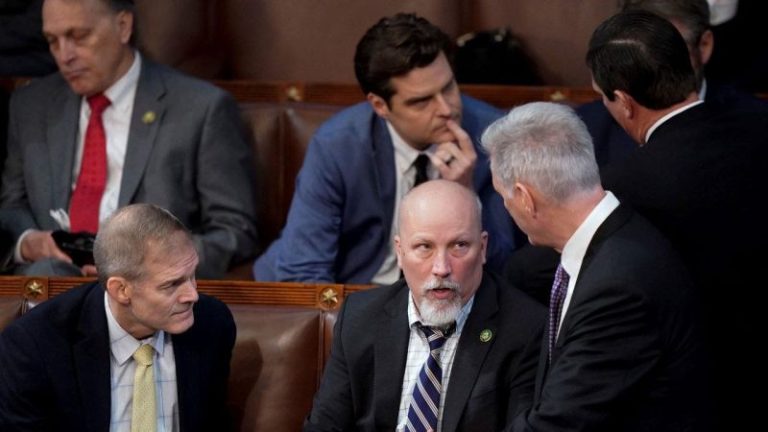The U.S. government was expected to hit its borrowing limit on Thursday, which puts the new House Republican majority in a position to pump the brakes on federal spending after an explosion of new debt in the COVID era.
The GOP majority means they have a say over how much – or even whether – to increase the $31.381 trillion debt ceiling by the early summer, which is when the Treasury Department says it will need new borrowing authority. Republicans so far appear to be unified around the idea of some level of spending cuts before any agreement can be reached to raise the debt ceiling.
House Speaker Kevin McCarthy, R-Calif., has been saying for weeks that he’ll insist on spending cuts, and behind him stand several Republicans with a range of views on how to proceed. Some, like Rep. Chip Roy of Texas, have specific ideas worked out already, such as capping fiscal year 2024 levels at fiscal year 2022 levels.
On Tuesday, Roy said in a radio interview that this idea is a ‘start’ and that the House needs to have a ‘serious conversation’ about how to get to a balanced budget in 10 years and then ‘attach’ that to the idea of raising the debt ceiling.
In contrast, Rep. Andy Biggs of Arizona indicated that he’ll never agree to a debt ceiling hike even if Democrats and the Biden administration somehow agree to steep cuts, saying that the government already has plenty of money.
‘We cannot raise the debt ceiling,’ Biggs tweeted Wednesday. ‘Democrats have carelessly spent our taxpayer money and devalued our currency. They’ve made their bed, so they must lie in it.’
As of this week, there does not appear to be a unified GOP position on the debt ceiling, and congressional aides indicated that Republicans would be meeting next week to flesh out a strategy. Those meetings could end up setting conditions that must be met before key factions of the House GOP majority can agree to a debt ceiling hike.
But the lack of a common position among the GOP may not matter yet. Even as Republicans sharpen their spears in preparation for negotiations over how to shrink the $6.3 trillion federal government, it became clear this week that the first skirmish will likely be whether the Democrats send anyone from their side to negotiate.
The Biden administration has staked out an early position that the debt ceiling must be raised without any conditions. That follows the pattern Democrats have taken for years, which is that any default by the U.S. government would be an economic disaster and that the debt ceiling must be raised without delay or any discussion about new commitments to changing the way the government spends money.
‘Failure to meet the government’s obligations would cause irreparable harm to the U.S. economy, the livelihoods of all Americans and global financial stability,’ Treasury Secretary Janet Yellen said last week.
This week, the White House made it clear several times that it doesn’t believe there is anything to negotiate.
‘As President Biden has made clear, Congress must deal with the debt limit and must do so without conditions,’ White House press secretary Karine Jean-Pierre said Tuesday.
‘We’re not going to work our way around this; we’re not going to negotiate on this,’ she said. ‘We are not going to be negotiating over the debt ceiling.’
Republicans know all too well the danger of dealing with big, important issues at the last minute – last year’s $1.7 trillion omnibus spending bill was introduced late, rushed to the floor and passed by House Democrats, a tactic Republicans have vowed to end under their majority. That’s why for now, Republicans are intent on making sure there is some kind of back and forth.
‘I would like to sit down with all the leaders, and especially the president, and start having discussions,’ McCarthy told Fox News over the weekend. ‘I believe we can sit down with anybody who wants to work together.’
‘I want to sit down with him now so there is no problem,’ he added.
House Freedom Caucus Chairman Scott Perry, R-Pa., sees it the same way, and he believes the best way to make progress is to start talking now before it becomes an emergency.
‘Let’s fight now to end the status quo,’ he said on CNN in January. ‘Let’s get in the room now.’
The broader fight over the debt ceiling is likely to be stuck for several weeks in this skirmish about whether Democrats should negotiate. There won’t be a burning need to do anything until the summer, and the Biden administration is likely to use that time to build the Democrats’ case that the debt ceiling should be raised without conditions.
One factor that could shake up the status quo is whether a consensus builds around the idea of negotiations, and already this week, Republicans appeared to pick up support from Democratic Sen. Joe Manchin of West Virginia. He told Fox News in an interview in Davos, Switzerland, that bipartisanship is the only way forward, and he agrees with the GOP that the government has a spending problem.
‘We have to work together,’ he said. ‘I think what we have to do is realize that we have a problem. We have a debt problem. We’re $31, I think $31.4 trillion in public debt right now. And all we’re saying is, should we not make sure that we all recognize how we got there, how we prevent from going further?’

